Meet NC State's Jannah Eissa, the ACC's first hijab-wearing basketball player
"Your hijab is not going to stop you from doing anything."
Jannah Eissa just turned 18 years in February. She is a walk-on on the N.C. State women’s basketball team, meaning she doesn’t have an athletic scholarship. She has played just 28 minutes all season and made one field goal.
And yet, when No. 3 N.C. State takes the court on Saturday afternoon in Raleigh to face No. 14 Chattanooga in the first round of the 2024 NCAA DI women’s basketball tournament, she will be making a massive impact.
Eissa, who was born and raised in Cairo, Egypt, is the first basketball player in ACC history to wear a hijab on the court. She’s one of a small-but-growing number of hijab-wearing women playing NCAA Division I basketball.
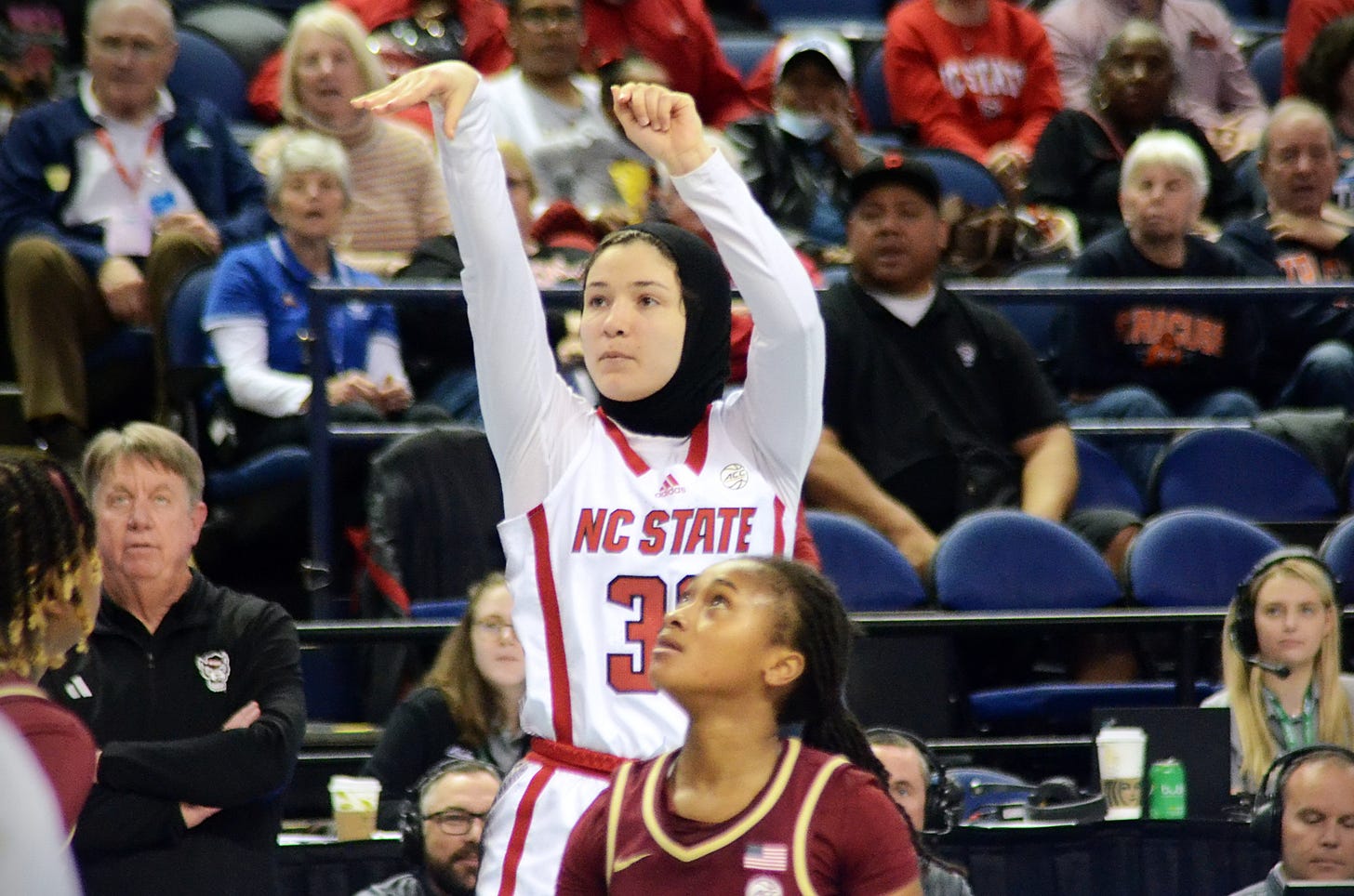
Bilquis Abdul Qadir — who played for Memphis from 2009-2013 and at Indiana State from 2013-14 — was the first woman to play NCAA basketball while wearing a hijab. In 2022, Kiandra Browne of Indiana (now at Duquesne) wore a hijab in the NCAA tournament. This year during the NCAA tournament, two players will be wearing a hijab — Eissa and Diaba Konaté, a French point guard who will play for No. 13 University of California, Irvine when the Anteaters take on No. 4 Gonzaga on Saturday evening in Spokane.
These trailblazers are, quite literally, changing the game. FIBA, the international governing body of basketball, banned players from wearing hijabs during games until 2017. In France, where the Olympics will be played this summer, the discriminatory ban still exists. (Earlier this month, activist groups issued an open letter calling on the French Federation of Basketball to overturn the ban; it was signed by Breanna Stewart, Becky Sauerbrunn, and Layshia Clarendon, among many others.)
Eissa is proud to wear a hijab, and cherishes of the visibility that playing at a school like N.C. State and in a tournament like the NCAA championships will provide.
“It definitely means a lot because you're representing a whole lot of women and a whole religion,” she told Power Plays this week.
All year long, she’s felt how much her presence on the team matters. This season, a group of young, Muslim girls came to a few N.C. State games just to support her.
“After they saw my posts, they're like, ‘Oh, my God, there's a hijabi girl on the N.C. State team, we want to go watch!’ I have very cute pictures with them,” she said. “They think that — and it's actually true — that your hijab is not going to stop you from doing anything. You can make it anywhere.”
From Cairo to Raleigh
Eissa began playing basketball when she was just three years old. At first, she played because her two older sisters, Salma (22) and Aleya (20), played, and she wanted to do everything they did. But it quickly became apparent that she had real talent and a passion for the sport. When she was 15, she made it onto the Egyptian youth national team.
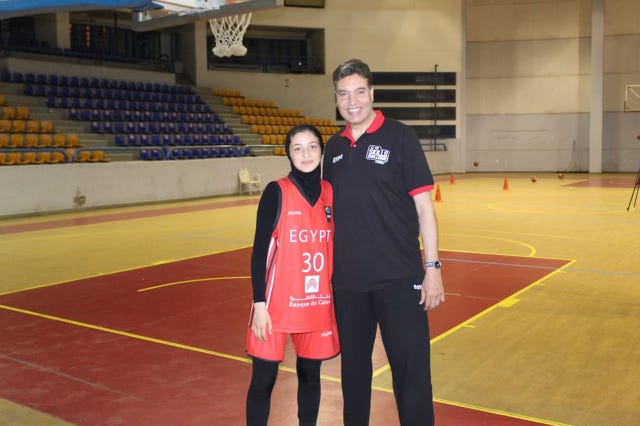
She was accepted to multiple colleges in the United States and even got a basketball scholarship offer from Illinois Tech. But her path was pretty clearly laid out in front of her.
After all, her father got a PHD in chemical engineering from N.C. State. And her two older sisters go to N.C. State.
“We're a N.C. State family. So my dad's like, ‘You're going to N.C. State,’” she said, laughing. “I didn’t have an option. But I like it here!”
Still, Eissa wasn’t prepared to let go of basketball.
A few years ago, Eissa’s sister Salma tried out for a walk-on spot with the Wolfpack and didn’t make the team. Last fall, her father reached back out to N.C. State associate head coach Nikki West and told her that he had another daughter coming to campus.
Tryouts were in September, weeks after the semester started. Eissa and a couple of other hopefuls had a 25-minute scrimmage with male practice players, while the coaches — including West and head coach Wes Moore — stood and observed. Eissa was very nervous, and didn’t feel she performed her best. But on October 13, just two weeks before the season opener, Moore gave her the official word: She was on the team.
It was a dream come true. Two years prior, when Eissa was still in high school and just visiting her sisters at N.C. State, she and Salma attended a women’s basketball game at Reynolds Coliseum. Sitting in the stands on the baseline, she snapped a picture and posted it to her Instagram story, adding the hourglass emoji.
“It was like, ‘Wait for me, I'm gonna play here,’” she recalled.
“And I'm looking at the story right now. Like, how did I even make it? I cannot believe I made it.”
Ramadan and representation
This year, March Madness coincides with Ramadan, a holy month for Muslims where they fast from sun up to sun down every day.
Since Egypt is a majority-Muslim country, Eissa is used to living in a place where schedules shift for everyone during Ramadan — in sports, this means practices and games are usually scheduled at night. But in the United States, that’s obviously not the case. That’s made this Ramadan a little bit more difficult. But she’s also found it to be empowering — especially watching other Muslim athletes, like Kyrie Irving of the Dallas Mavericks and N.C. State men’s basketball player Mohamed Diarra, achieve great athletic success while fasting.
“It's actually so cool,” she said. “And it just lets everyone know how strong you are for doing that.”
The support from her Wolfpack family has helped, too. In fact, before she could even talk to athletic trainer Brittany Blunt about Ramadan, she saw Blunt pull out a note card filled with facts about the holy month; she was proactively doing her own research.
“It made me so happy,” Eissa said.
Eissa, understandably, was worried that she would face discrimination or disrespectfulness from her teammates and coaches. But instead, she’s been met with nothing but acceptance. The equipment staff always makes sure she has leggings and long-sleeved shirts to wear during games that match the uniform requirements; her teammates make sure she’s covered before any male coach enters the room; and everyone is always asking her questions about her faith, which she absolutely loves.
“I’ve definitely learned a lot from her,” said her teammate Aziaha James, who calls Eissa her “bestie.” “It’s been really great.”
N.C. State’s first-round game on Saturday starts at 2:30pm ET, so Eissa will be fasting throughout. But if the team advances to the second round and gets scheduled for a Monday night game, she knows Blunt and the team dietician, Molly Barkman, will have her back.
“They're definitely gonna bring me something on the bench to eat,” she said. “I’m looking forward to it.”
The next steps
Eissa isn’t sure what lies ahead after this season. She loves N.C. State, on and off the court, and her dad certainly wants her to stay for the full four years and get that chemical engineering degree. But sometimes, she does consider transferring to a school where she could get an athletic scholarship and more playing time.
No matter what, she wants basketball to be a part of her life. She loves “everything” about the sport.
“It just it lets me know new people, and it lets everyone know a lot about me — everyone’s getting so curious about Islam, the religion, Ramadan, the whole thing,” she said. “I'm just super happy.”
And she has a message for those organizations that are banning women in hijabs from competing in sports, and for anyone who might look at her and think that because of her hijab, she doesn’t belong on the basketball court with her N.C. State teammates.
“If I was less than anyone else, I wouldn't be on this team. If I was less than anyone else, I would just not be playing basketball on this level,” she said. “And if anyone thinks that I’m less, then they're the ones that are less. That's it.”

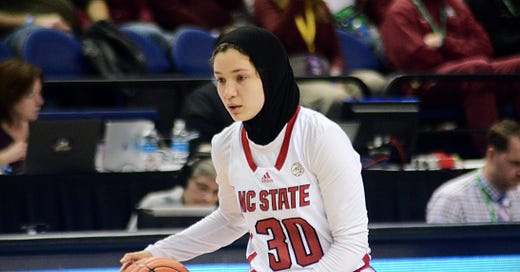



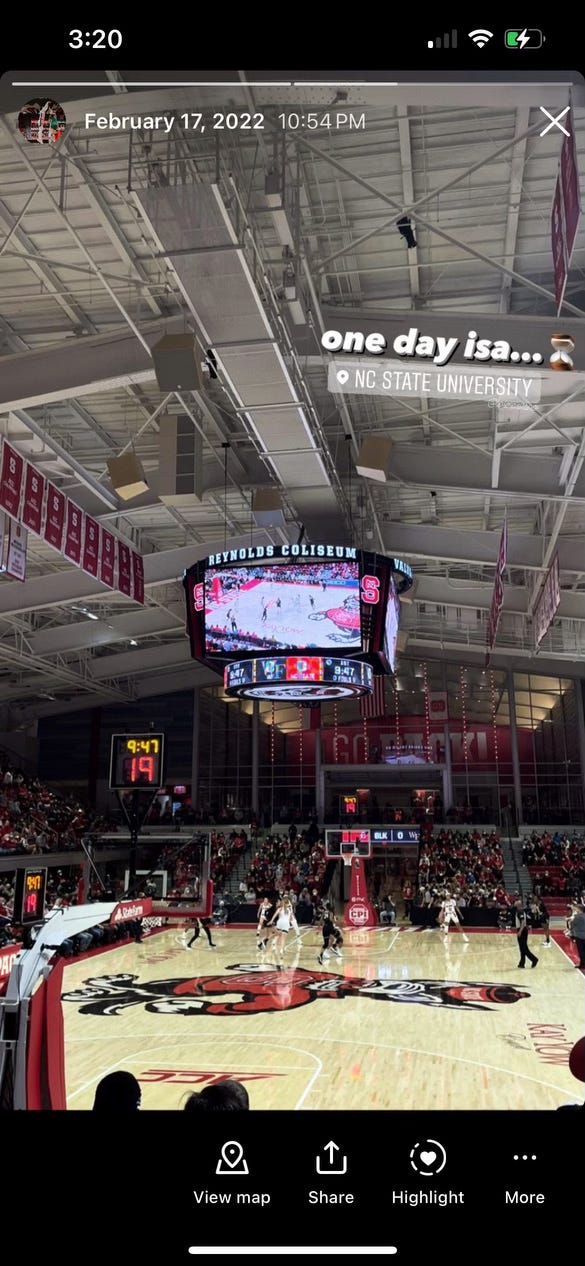

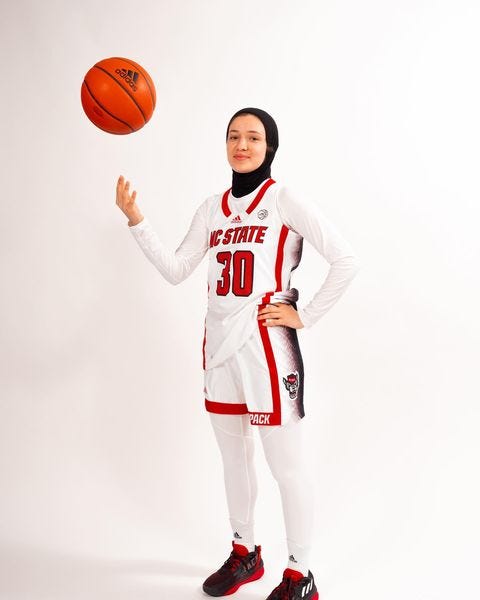
I didn’t watch women’s college ball much until this season. When I noticed Eissa during the ACC tournament, I became curious about how many other players wear a hijab. I really enjoyed reading this and learning more about her story. Good luck to Eissa & NC State in the tournament!
Thank you for this really great coverage. WBB has so many interesting aspects that need exploring.